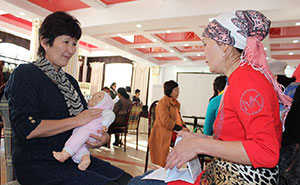
Training Supervisors in Mentoring and Related Monitoring Activities
This guide provides facilitators with the technical knowledge and skills they need to help supervisors mentor health workers who provide infant and young child feeding (IYCF) counselling.
Purpose
The purpose of this facilitator’s guide is to prepare mentor-supervisors to help health workers improve their counselling performance through the provision of ongoing mentoring. Although the focus of this particular training is infant and young child feeding (ICYF), these mentoring skills can be applied to other content areas such as counselling on maternal and adolescent nutrition and anemia; and growth monitoring and promotion, where the mothers/caregivers receive counselling on the feeding and care of their children based in part on the results of their anthropometric and feeding assessments. Mentoring is intended to be used flexibly and as needed. As health workers become more proficient in one area (e.g., IYCF counselling), the mentoring process may be used to address another task (e.g., counselling on women’s nutrition), checking periodically to see that the worker continues to retain the skills developed in IYCF counselling.
Specific Objectives of the Training of Mentor-Supervisors
By the end of the training, participants will have acquired and/or strengthened the following knowledge and skills:
Knowledge
Participants will be able to:
- Define mentoring (mentoring-supervision) and its components
- Suggest a model of mentoring appropriate for their setting
- Describe how mentoring can contribute to monitoring and improved programs, services and worker performance
Skills
Participants will be able to:
- Use mentoring skills to help a health worker improve his/her IYCF counselling performance
- Provide effective feedback based on observation of IYCF counselling, including feedback on basic IYCF counselling skills: Listening and Learning, Building Confidence and Giving Support, and 3-Step (Assess, Analyze, Act) IYCF counselling
- Use tools (job aids and tabulation forms) to facilitate mentoring
- Identify individual worker weaknesses and shared group challenges, and determine a course of action to identify how to address the issues
- Develop action plans for needed actions (at national, oblast, or rayon levels) to implement mentoring within the existing supervision system
Terminology
This guide uses the term "mentoring" (or "mentoring-supervision"), as opposed to "supportive supervision," to avoid potential confusion with the Kyrgyz use of "supportive supervision." In the Kyrgyz Republic, "supportive supervision" refers to administrative oversight delivered in a supportive manner and provided periodically to oversee and monitor a facility’s services, records, supplies, finances, and workers.
The term "mentoring" is used here to mean supervisor coaching of individual health workers to improve the quality of health service delivery—in this case, mentoring to strengthen the knowledge and skills needed to counsel a mother on infant and young child feeding.
To read the full document, please download the PDF in English or Russian above.